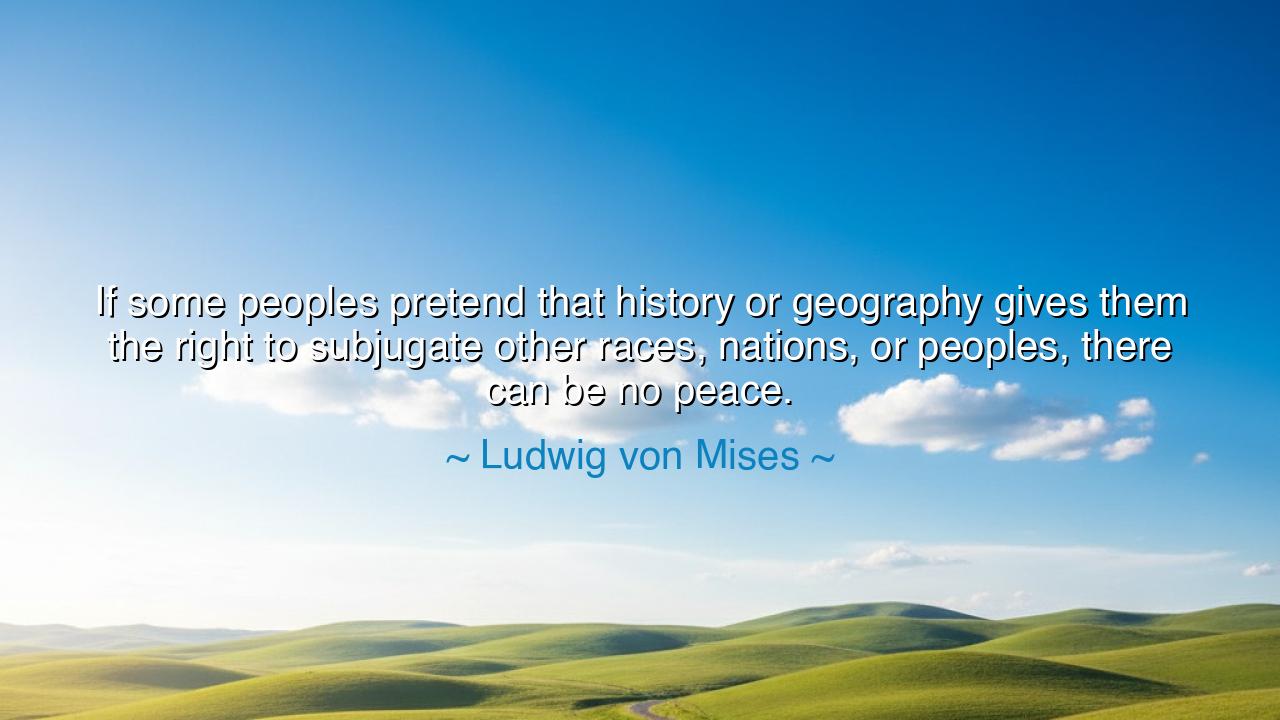
If some peoples pretend that history or geography gives them the
If some peoples pretend that history or geography gives them the right to subjugate other races, nations, or peoples, there can be no peace.






When Ludwig von Mises declared, “If some peoples pretend that history or geography gives them the right to subjugate other races, nations, or peoples, there can be no peace,” he spoke as one who had seen the madness of tyranny and the ashes left in its wake. A man of reason born in an age of ruin, Mises watched Europe descend into flames — first under the banners of empire, then under the iron heel of ideology. His words were not shaped in comfort but carved from the agony of witness. They are not mere politics; they are prophecy — a warning that peace cannot coexist with pride that seeks dominion over others.
Mises was an economist and philosopher, but in this statement, he spoke not of markets or trade, but of human dignity. He understood that every empire, every conquest justified by history or geography, is a veil for arrogance — the belief that one people’s destiny outweighs another’s right to freedom. The Romans once claimed divine sanction to rule the world; the colonial powers later cloaked conquest in “civilizing missions.” Always the same delusion: that might makes right, that the land or past belongs to one chosen race or nation. Mises, having fled the darkness of Nazi occupation, saw this evil clearly. He knew that until mankind abandons the illusion of superiority, war will forever be reborn.
Think of the tragedy of World War II, that furnace where nations burned for the pride of a few. The ideology that birthed it — that one race was destined to rule — was nothing but the very sin Mises condemned. Under that lie, millions perished, cities were turned to dust, and civilization itself trembled on the brink of extinction. History and geography were invoked as weapons: “This land was once ours,” “These people are lesser,” “Our ancestors demand vengeance.” And yet, in the end, what did all this righteous cruelty yield? Only graves, grief, and a generation haunted by the echo of its own barbarity.
But Mises’ message reaches beyond the past; it warns us still. For even now, in every corner of the world, the old poisons stir beneath new flags. Nations boast of their ancient glory, peoples quarrel over borders drawn by forgotten kings, and men claim that the soil beneath their feet makes them more worthy than another’s birth. Mises would say: Beware. The earth belongs to none but all; the past is not a weapon but a lesson. When we justify oppression with history, we make history itself a tyrant. And when we worship geography as destiny, we become slaves to the very ground we walk upon.
True peace, Mises teaches, cannot be born from conquest or pride. It springs only from mutual respect — the recognition that every nation, no matter how small, carries its own sacred flame of purpose. When one nation seeks to extinguish another’s flame, it darkens its own. The peace of the world is like a delicate web: tear one strand, and the whole quivers. To preserve it, we must see in every culture not a rival, but a mirror of our own humanity.
Consider the rebuilding of Europe after the war — how nations once divided by hatred chose cooperation through the European Union. That union, though imperfect, was born from the very wisdom Mises foresaw: that peace thrives where power is shared, not hoarded. The rivers that once carried armies now carry trade and friendship. The mountains that once marked bloodied frontiers now host treaties and trust. In this transformation lies the living proof of Mises’ truth — that no peace endures where pride enslaves, but lasting peace is forged in equality and reason.
So let us take this lesson to heart, O children of the future: no flag, no past, no border can justify domination. If you would build a lasting peace, build it upon the foundation of respect — upon the sacred idea that each people has the right to its destiny, free from the chains of another’s ambition. Honor your ancestors, but do not make them instruments of hate. Treasure your homeland, but do not let it become a fortress of fear. For in the end, the earth remembers not the conqueror, but the creator; not the tyrant, but the teacher.
And thus, as the ancients might say: He who seeks to rule the world will destroy it; he who seeks to understand it will save it. Let every nation, every soul, heed the wisdom of Ludwig von Mises — that only when pride is humbled and justice exalted shall the world finally know peace.






AAdministratorAdministrator
Welcome, honored guests. Please leave a comment, we will respond soon